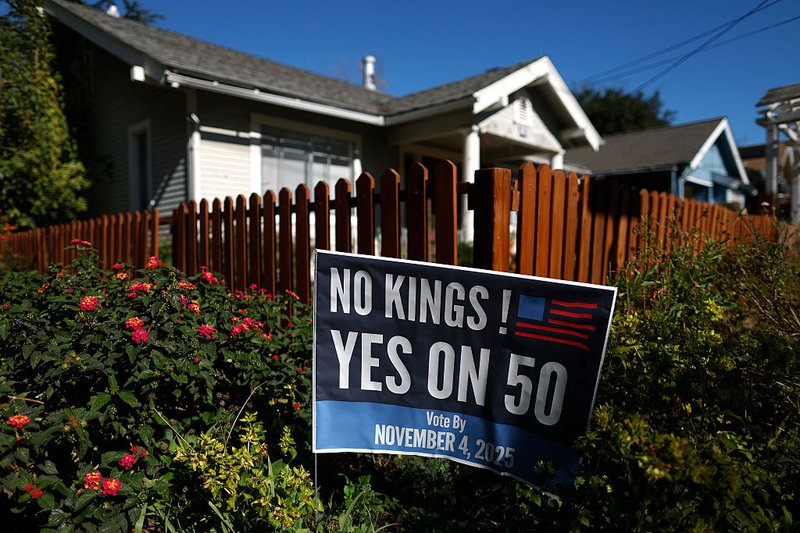Why California’s Prop 50 Is a Victory for Democracy—Even in Its Irony
Article In The Thread

Justin Sullivan via Getty Images
Nov. 12, 2025
Last week, California voters overwhelmingly approved Proposition 50, a measure allowing the state legislature to temporarily reclaim some control over congressional redistricting. The goal was straightforward: to counter Texas’s mid-decade redistricting plan, which is expected to net Republicans several additional U.S. House seats in 2026.
For those who care about fair maps—and that includes seven in 10 Californians surveyed this October—this result feels awkward. California built one of the country’s most respected independent redistricting commissions, created to remove politics from the process of drawing legislative maps. Now it’s suspending it, however briefly.
But the deeper story here isn’t about hypocrisy. It’s about who gets to decide when and how the rules of representation change.
California’s independent redistricting commission exists because voters created it through a ballot initiative in 2008. And because that commission is written into the state constitution, lawmakers couldn’t simply override it when national partisan incentives shifted. To change the rules, they had to go back to the public and ask for their consent.
Texans, by contrast, got no such say. Like 23 other states, Texas has no statewide ballot initiative or referendum process. When Governor Abbott and the super-majority Republican state legislature—at the urging of President Trump—moved to redraw districts to entrench partisan advantage, there was no public approval step, no people’s veto, no constitutional safeguard. Texans simply woke up to new political boundaries.
That contrast exposes both the promise and paradox of direct democracy today. States like California, which have empowered voters to build fairer systems such as nonpartisan redistricting commissions, must return to the voters before altering them or face a referendum. That can look like weakness in a national partisan power struggle where states without these safeguards can act unilaterally. But allowing or requiring public consent is the point. It is the mechanism that protects democratic legitimacy. In a moment of democratic stress, this is a feature to expand—not retreat from.
This check on power was the original purpose of direct democracy in the United States. At the turn of the twentieth century, on the heels of the Gilded Age, populists and progressives introduced initiatives and referendums as safeguards against moments like this—against captured legislatures and entrenched party machines. When the incentives of those in power diverge from the public interest, or when they fail to regulate themselves, the public must have a mechanism to intervene directly.
And for more than a century, that mechanism has largely worked. Ballot initiatives have helped Americans upgrade and democratize our political institutions: securing women’s right to vote, direct election of U.S. senators, and, more recently, adopting independent redistricting commissions, ranked-choice voting, and public campaign financing and campaign finance disclosure systems. When representation has faltered, citizens have used direct democracy to repair it.
Today, that architecture of self-correction is under strain. Only about half of U.S. states allow citizens to propose and repeal state laws. In those that do, reform-minded voters have frequently used the initiative to defend and improve representation. In states without them, dominant parties face fewer obstacles to entrenching power. One state plays fair, another plays to win. In a nationwide contest where some politicians are prepared to go nuclear, it’s up to the people—and the courts—to show that fair play isn’t unilateral disarmament.
Outside of deep-blue California, states where voters have used direct democracy to enshrine fair districts are doing just that. In Utah, citizen-created redistricting rules are constraining the legislature’s attempts to gerrymander. In Missouri, organizers have gathered enough signatures to force a referendum on lawmakers’ mid-decade maps.
The vulnerability in the system is not in these states, but in those without citizen lawmaking power. The erosion of the Voting Rights Act has only deepened this asymmetry. Many of the states where representation is most vulnerable—including Texas, Alabama, and Georgia—are, not coincidentally, those where voters lack direct democracy at the state level. There, when lawmakers dismantle protections or redraw maps to dilute the minority vote, citizens have no direct democratic remedy.
As the Voting Rights Act weakens and the flaws of single-member districting become more apparent, the next frontier of democracy reform will likely come through ballot initiatives once again—this time through proportional representation, the most effective means for ensuring that parties and communities win seats in rough proportion to their support. The answer is not to play defense or backtrack on direct democracy, but to go on offense and extend its reach to more states.
Direct democracy is not a replacement for representative government. It’s a constitutional pressure valve, a safeguard for the moments when representation breaks down.
Whether California voters made the right call last week on Proposition 50 will become clear only in time. What matters today is that they had the chance to decide.
You May Also Like
4/20 Is More than a Holiday—It’s a Case for Direct Democracy (The Thread, 2025): Maresa Strano and Mark Schmitt remind us that 4/20 isn’t just about cannabis, it shows that when lawmakers stall, voters can lead.
By the People: Expanding Citizen-Led Policy in the United States (Political Reform): Amid deepening political dysfunction and distrust, New America’s Political Reform explores the uneven landscape of citizen-led policymaking in the United States.
America’s Winter of Political Discontent Could Spark a Democratic Spring (The Thread, 2025): Lee Drutman outlines how this winter of discontent for U.S. politics could spring seeds of renewal—if we mobilize voters and reform our elections.
Follow The Thread! Subscribe to The Thread monthly newsletter to get the latest in policy, equity, and culture in your inbox.